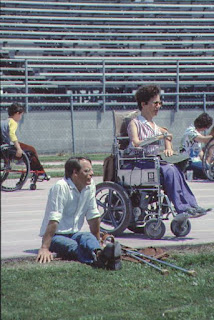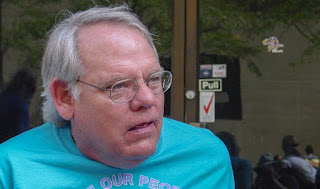On October 1, 1985, a new opportunity presented itself to Louis. He had recently met Deborah Cunningham, a vibrant young woman who had also contracted polio as a child and also lived with disabilities more severe than those that Louis lived with, but who, like him, had boundless energy and appetite for life along with a rigorous sense of dignity.
She and Louis, along with Fred Dinwiddie, Nigel Shapcott and Michael Heinrich, formed a corporation called Access All Areas to replace a structure under Easter Seals with one run by and for citizens with disabilities. It is now the Memphis Center for Independent Living, one of many CIL’s all over the country that fight for people who have for generations been treated as perpetual children, at best, and, at worst, as people too strange to be part of the community.
At first the Center concentrated on physical barriers to mobility and participation in community life. They organized projects to build ramps so that people who used wheelchairs could get out of the house and insisted that restaurants, retail shops, theaters and government buildings be fitted with ramps and make other accommodations.
Being visible was as important as getting through the door to such public places. For example, like Louis and me, Deborah was a big movie fan. When she asked the proprietors of the Ridgeway Theater where the accessible seating was, they showed her to a booth at the very back of the theater that was walled off on three sides so that a person in a wheelchair could see the screen but other patrons could not see them.
Her response was, “I don’t do closets.” She proceeded to roll down to a better spot and parked herself in the aisle to enjoy the movie.
Eventually the proprietors just removed end seats on a few well placed-rows, so that patrons like Deborah and Louis could be regular members of the audience. The issue of visibility as well as access came up again with restaurants that wanted to put ramps at a back entrance out of sight, until they were told that this was not acceptable.
The passage of the 1990 Americans with Disabilities Act provided a resource to compel private businesses and local governments to make accommodations, although it was frequently necessary to bring lawsuits to force compliance with the law. This was a shock to me, because I thought when someone broke the law all you had to do was call the police!
One of these lawsuits resulted in the 1999 Supreme Court Decision, Olmstead v L.C, which dealt with people who were eligible for Medicaid funds being unnecessarily relegated to nursing homes, creating a very profitable industry. The court said that the ADA required that citizens with disabilities have the option of receiving attendant services in “the most integrated setting,” and that steering people into nursing homes rather than allowing them to receive attendant care in their own homes was effectively segregation.
Even the Supreme Court could not break this pattern, though, because states found loopholes to avoid compliance. Tennessee was one of those states for a long time. Because Colorado was not, the Center helped people who wanted to get out of nursing homes to move there, a project they called the Underground Railroad, an escape to freedom. Eventually the Center and other advocates persuaded Tennessee to change the policy.
My husband and the Center worked with the city to improve public transportation, make sidewalks safer for wheelchair users and make the negotiation of public streets safer with better curb ramps. They also backed the adoption by the City Council of a Visitable Homes Ordinance to require that new homes built with public funds have at least one accessible entrance and doors wide enough to allow wheelchair users to enter the homes of friends and relatives as well as public buildings. They argued that the population of people with disabilities is the largest minority in the country, of which any one of us can become a member in the blink of an eye and most of us will join if we live long enough.
A big part of the Center’s work involves educating the greater community about false assumptions and careless language about disability. Too many Americans accept the specious ideology that avoiding hurtful and dangerous language in reference to other people is a wimpy cop-out to what they call “political correctness,” as if being rude and abusive took courage.
In addition, the Center acts as an advocate between a person and his or her employer, landlord or others when instances of discrimination arise. It also works to liberate people who are unaware of opportunities for education and employment that are available to them or who have internalized the prejudices of other people.
The requirement that the staff and board of directors of the Center be made up predominantly of people with visible disabilities means that they can demonstrate by example how one can reclaim autonomy over one’s everyday life. The Center is also dedicated to the idea that any political decisions involving people with disabilities must include the input of those people. One of the fundamental maxims of the center is NOTHING ABOUT US WITHOUT US.
Although the Center receives some government funding, it must raise additional funds in order to continue to operate. There are a number of events throughout the year that raise money and also provide opportunities for celebration and socialization. One of those events is coming up very soon.
On Friday, August 3 from 6:00 to 9:00, the center is holding its fourth annual Deborah Cunningham Access Awards dinner in the East Atrium of the Crosstown Concourse. Its primary function is to recognize individuals who have provided leadership in advocacy, but it’s a party too, featuring entertainment by Hope Clayburn and Joyce Cobb. Tickets are $40 per person or $300 for a table of eight.
It is a chance to learn more about what these advocates do and meet some of the leaders of the movement, as well as enjoy some good food and music. The center is also still looking for sponsors for the event, in case any of you know of a business or organization that might like to be associated with the center and its philosophy.
This year’s dinner is particularly a cause of celebration because it marks the twentieth anniversary of a successful pro se lawsuit brought by Deborah Cunningham against The Public Eye, a barbecue place in Overton Square that was willing to spend vastly greater funds in legal fees to avoid compliance with the ADA over a small step barrier at the entrance than it would have cost to comply.
With the support of Attorney General Janet Reno, it became Deborah Cunningham and the United States v The Public Eye. Not only was the original step barrier replaced by a ramp, but other accommodations were required and the proprietors had to pay the government and the Center for their recalcitrance. It was a big victory over what initially seemed to be a small barrier, but each such victory helps to break down the walls that isolate and segregate members of the community from each other.
 |
| Louis Patrick |
As John Kennedy said of the hope to end the cold war, the greatest obstacle to that end is the belief that it is impossible. It is not impossible. The conquest of fear can make it happen. The cause of independent living is not just for people with disabilities or who have friends or family members with disabilities.
Any of us can become a part of this very large minority at any time, but more importantly, all of us need to consider the dignity and happiness of any of us to be our business. This is our country and we are all involved in determining what kind of country we will be.





No comments:
Post a Comment